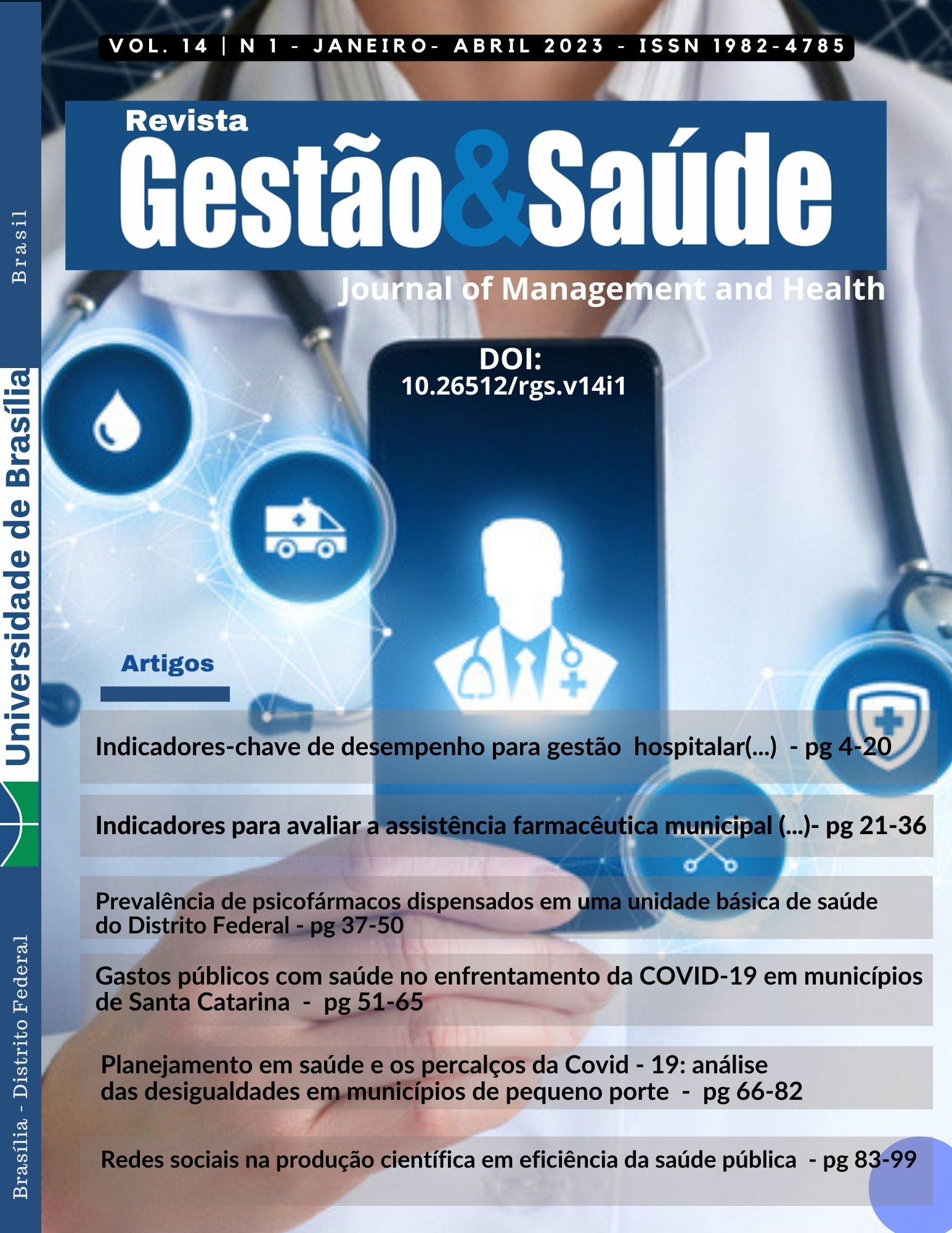Key performance indicators for hospital management
perceptions of public health managers in the southeastern region of Brazil
DOI:
https://doi.org/10.26512/gs.v14i1.40717Keywords:
Management indicators; , Health manager; , Hospital Public; , Public sector.Abstract
Brazilian public management in the health area has undergone several changes and the search for managerial performance tools that enable greater efficiency and effective results has had a greater prominence. Given the above, the objective of this study was to demonstrate the perception and experiences of public health managers about choice criteria, benefits and challenges in the use of key performance indicators in the hospital setting. This is a descriptive, cross-sectional study of qualitative approach developed with professionals who work in public hospitals in the southeastern region of Brazil. The data were collected through individual interviews with managers and analyzed by the content analysis methodology. The sample consisted of 11 professionals who presented a practical context of how this management tool can guide better decision-making and the challenges that are constantly faced.
Downloads
References
Noto, G., Corazza, I., Kļaviņa, K., Lepiksone, J., & Nuti, S. (2019). Health system performance assessment in small countries: The case study of Latvia. International Journal of Health Planning and Management, 34(4), 1408–1422. https://doi.org/10.1002/hpm.2803.
El Hadj Amor, E. A., & Ghannouchi, S. A. (2017). Towards KPI-Based Health Care Process Improvement. Procedia Computer Science, 121, 767–774. https://doi.org/10.1016/j.procs.2017.11.099.
Figueiredo, J. O., Prado, N. M. de B. L., Medina, M. G., & Paim, J. S. (2018). Gastos público e privado com saúde no Brasil e países selecionados. Saúde Em Debate, 42(spe2), 37–47. https://doi.org/10.1590/0103-11042018s203.
UN - United Nations (2018), ”arquivo”. Disponível em: https://www.population.un.org/wpp/DataQuery/. Acesso em 05 jun. 2019.
Organização Pan-Americana da Saúde (2018). Disponível em: https://www.paho.org/bra/index.php?option=com_content&view=article&id=569:conceito-doencas-cronicas-nao-transmisiveis&Itemid=463. Acesso em 30 Abr. 2019.
Shawahna R. (2020). Development of Key Performance Indicators for Capturing Impact of Pharmaceutical Care in Palestinian Integrative Healthcare Facilities: A Delphi Consensus Study. Evidence-based Complement Altern Med.
Harvey, H. B., Hassanzadeh, E., Aran, S., Rosenthal, D. I., Thrall, J. H., & Abujudeh, H. H. (2016). Key Performance Indicators in Radiology: You Can’t Manage What You Can’t Measure. Current Problems in Diagnostic Radiology, 45(2), 115–121.
Armijos JC, Núñez Mondaca A. (2020). Indicadores de gestión para evaluar el desempeño de hospitales públicos: Un caso de estudio en Chile y Ecuador. Rev Med Chil. 148(5):626–43.
Cohen K, Bruijns S. (2018). Describing key performance indicators for waiting times in emergency centres in the Western Cape Province, South Africa, between 2013 and 2014. South African Med J. 108(7):579–84.
Liu, H. C., & Itoh, K. (2013). Conceptual Framework for Holistic Dialysis Management Based on Key Performance Indicators. Therapeutic Apheresis and Dialysis, 17(5), 532–550. https://doi.org/10.1111/1744-9987.12019.
Jiang, S., Shi, H., Lin, W., & Liu, H. C. (2020). A large group linguistic Z-DEMATEL approach for identifying key performance indicators in hospital performance management. Applied Soft Computing Journal, 86. https://doi.org/10.1016/j.asoc.2019.105900.
Gualandi, R., Masella, C., & Tartaglini, D. (2019). Improving hospital patient flow: a systematic review. Business Process Management Journal.
Rotondo, F., Giovanelli, L., Fadda, N., & Ezza, A. (2018). A methodology to design a performance management system in preventive care. BMC Health Services Research, 18(1), 1002. https://doi.org/10.1186/s12913-018-3837-8.
Si, S. L., You, X. Y., Liu, H. C., & Huang, J. (2017). Identifying key performance indicators for holistic hospital management with a modified DEMATEL approach. International Journal of Environmental Research and Public Health, 14(8). https://doi.org/10.3390/ijerph14080934.
Leva, A. and Sulis, E. (2017). A business process methodology to investigate organization management: a hospital case study. WSEAS Transactions on Business and Economics, Vol.14, pp.100–109.
Maté, A., Trujillo, J., & Mylopoulos, J. (2017). Specification and derivation of key performance indicators for business analytics: A semantic approach. Data and Knowledge Engineering, 108(January), 30–49. https://doi.org/10.1016/j.datak.2016.12.004.
Muriana, C., Piazza, T., & Vizzini, G. (2016). An expert system for financial performance assessment of health care structures based on fuzzy sets and KPIs. Knowledge-Based Systems, 97, 1–10. https://doi.org/10.1016/j.knosys.2016.01.026.
Melman GJ, Parlikad AK, Cameron EAB. (2021). Balancing scarce hospital resources during the COVID-19 pandemic using discrete-event simulation. Health Care Manag Sci. 19:356–74.
Downloads
Published
How to Cite
Issue
Section
License
Copyright (c) 2023 ELECTRONIC JOURNAL MANAGEMENT AND HEALTH

This work is licensed under a Creative Commons Attribution-NoDerivatives 4.0 International License.
I declare that this article is original and has not been submitted for publication in any other national or international journal, either in whole or in part. I further declare that once published in the Electronic Journal Management and Health published by the University of Brasília, it will never be submitted by me or any of the other coauthors to any other means of scientific dissemination.
Through this instrument, in my name and in the name of the other coauthors, may I soon copy the copyright of the article to Electronic Journal Management and Health and declare that I am aware that failure to comply with this commitment will subject the violator to penalties and penalties Law of Protection of Rights Authorities (Nº9609, of 02/19/98).


